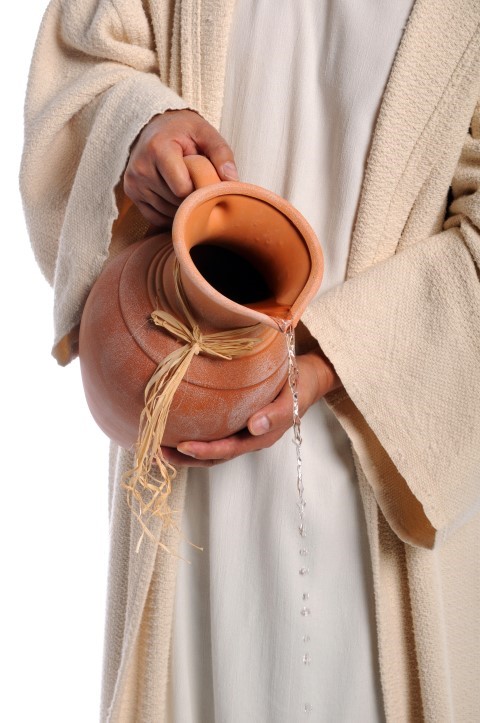Lord and Christ!

Genesis 41:37-40; Matthew 12:15-21; Acts 2:33-36; 1 Corinthians 1:1-3; 2 Corinthians 1:19-22
I would like us to consider the Headship and Lordship of Christ that we may find, first the blessing secured for the saints of God in Him who is raised from among the dead and glorified at God’s right hand; then, as the result of our being blessed in Him as Head, the obligation, as well as the great privilege, of being subject to Him as our Lord.
We may well give special attention to these two thoughts in these last days of the church’s history on earth, when in her responsibility she has very apparently failed. We may well give thanks to God that in these days of weakness and failure the same grace and guidance are available for us, as in the early days of the church. Thus a way is open for the overcomer; that is, for any who will avail themselves of the grace given, to enjoy the blessings and answer to the obligations.
When you read the verses in Genesis 41 you would see in Joseph typically what we have really in Christ. As with the Lord Jesus, so it was with Joseph, humiliation and rejection preceded exaltation. Joseph came, as sent by his father, to enquire as to the welfare of his brethren, but was met by their hatred and sold by them into Egypt. The Spirit of God records that with Joseph three things went down into Egypt, spices, balm, and myrrh. We see the beauty of this only as we view by faith Him who is greater than Joseph. The spices would surely tell us of the fragrance of the perfect life of the Lord Jesus. He did always the things that pleased the Father and which could be fully appreciated only by the Father. The balm would set forth the healing power and grace offered to man and available to everyone in need. The myrrh would set forth the sorrow which was ever His portion down here as the “Man of sorrows” in a world of sin and grief. Thus, in the type, we see that if Joseph is sent into Egypt the blessing must go with him. Until his brethren come to where he is, their history is one of failure and famine.
Our thoughts revert to Matthew 23:38–39, where we see the Lord Jesus rejected by His earthly people, leaving the temple for the last time, and we hear Him saying, “Behold your house is left unto you desolate; for I say unto you, Ye shall not see me henceforth till ye shall say, Blessed is He that cometh in the name of the Lord.” In the passage we read, in chapter 12, the Pharisees were counselling to destroy Him, while He Himself (now in seclusion) was still going on with His works of goodness, and God was inviting those who had ears to hear and anointed eyes, to behold the beauty of His Servant, in whom His soul delighted.
The passage from Isaiah 42 quoted in Matthew 12 closes with the words, “In Him shall the Gentiles trust.” In verse 37 of our chapter in Genesis we read, “The thing was good in the eyes of Pharaoh, and in the eyes of his servants.” These words show that our hearts are to be engaged with Him who was ever God’s delight, and that the One who was rejected and crucified here, has been made Lord and Christ. To Joseph, Pharaoh addresses the words, “Thou shalt be over my house and according to thy word shall all my people regulate themselves.” Joseph was not only a dreamer of dreams, he was also the interpreter of dreams and the fulfiller of them.
I have thought that the words “Thou shalt be over my house” might be considered in the light of the truth brought before us in 2 Corinthians. Our hearts are there set at rest through being engaged with the Son of God, Jesus Christ, in whom all the promises of God are eternally verified.
In Psalm 36 we read, “They shall be abundantly satisfied with the fatness of Thy house; and Thou shalt make them drink of the river of Thy pleasures.” Through the work of redemption accomplished on the Cross, God can now bless man according to His own purpose and grace. Christ’s place in the glory is the pattern and pledge to all who put their trust in Him. Of course we must always bear in mind that in all things He must have pre-eminence. The Spirit of God who indwells each believer is the anointing, the seal, and the earnest of all our blessings. In Ephesians 3 we find the apostle saying, “Unto me who am less than the least of all saints is this grace given that I should preach among the Gentiles the unsearchable riches of Christ.” The Gospel of the Glory, then, as committed to Paul, brings before us in a special way God’s thoughts of blessing for all who believe on His Son during this present day of grace. Believers are blessed with all spiritual blessings in heavenly places in Christ.
The Headship of Christ is viewed in various aspects in Scripture: 1 Corinthians 11:3; Ephesians 1:10, 22; Colossians 1:18; 2:10. The prominent thought seems to be derivation. If it be the saints today, or the redeemed creation in the coming day, all are to derive from, and take character from Him who is Head. But if through sovereign grace all our blessings are eternally secured in our risen and exalted Head, there are also present obligations resting upon us as the result of these blessings being ours.
This brings us to the second part of our verse in Genesis 41, “According to thy word shall all my people be ruled.” May we not apply these words to the main teaching of 1 Corinthians, where we have the Lordship of Christ prominently brought before us? The world has expressed its thought of the Son of God in the words, “Away with Him, crucify Him.” God has given His answer to this in making Him Lord and Christ. We find it stated in Acts 10:36. “He is Lord of all.” This is not yet publicly manifested.
We may briefly consider the Lordship of Christ in a threefold aspect. First, in relation to believers individually, as in 1 Corinthians 6: “Ye are not your own for ye are bought with a price: therefore glorify God in your body.” The body is for the Lord and the Lord for the body. We do well to pause here and challenge ourselves in this manner, “Is the Lord Jesus, the One whom the world refuses, the One into whose hands God has committed all things, controlling and guiding me in every detail of my life?” His claims upon us are claims of love. May we ever say from the heart, “Lord we are Thine, Thy claims we own.”
Secondly, we have the collective sphere where His Lordship is to be maintained in 1 Corinthians 12 and 14. In the great house of profession, we see everywhere human organization. While the Lord’s name is professed, God’s word, and the divine order set forth therein, are ignored or refused. Is there then a possibility of yielding to Him His rights in this collective way? Surely there is. The instructions given in 1 Corinthians 12 are obligatory on us today in spite of the outward breakdown of the church. This was surely anticipated by the Lord Jesus when He promised that “Where two or three are gathered together in My name there am I in the midst of them.” If there has been failure, and if there is but little strength, surely there is still an open door for faithfulness.The new cart, setting forth human arrangement, might be tolerated amongst the Philistines, but not amongst the people of God. See 1 Samuel 6:7, and 2 Samuel 6:3–7.
Finally, the full extent of the Lordship of Christ will be manifested when He shall have put down all rule, and authority, and power, and shall deliver up the kingdom of God, even the Father, that God may be all in all, as we see in 1 Corinthians 15. May it be ours through grace, while waiting for His coming, to be rejoicing in the blessings He has won for us, and gladly owning His claims upon us in every sphere, saying from our hearts:—
“Thee we reverence, Thee obey,
Own Thee Lord and Christ alway.”





